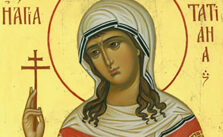Photo: rg.ru Those who have read the Lives of holy martyrs know that they are often similar to each other, as if compiled according to the same plan. This is because during the era of persecutions a huge number of martyrs suffered for Christ, and it was impossible even for their contemporaries to collect information about the lives of each of them. Often the compiler of the Life of a particular martyr only knew that the person in question was a Christian, that he was arrested, demanded to renounce Christ, tortured and sentenced to death. In this the fate of all martyrs was similar. As a rule, other information simply did not exist, and therefore the biographies of the majority of Christians who suffered for the faith were written according to this plan.
In addition, often the only source where information about the life and especially the death of a particular martyr could be found was the so-called acts of martyrs—that is, records of Roman law enforcement agencies that tried and passed death sentences on Christians. Clearly, these acts were written in a dry legal language, written according to a certain template and did not differ much one from another. Consequently, it is another reason why the Lives of the martyrs that have come down to us are usually very similar.
By the way, there is another example in the history of the Church, much closer to our time. These are the Lives of the New Martyrs and Confessors of Russia, who suffered from the godless authorities in the twentieth century. Their Lives are being compiled in our days, and they often have the same feature—they resemble each other and are built on the same pattern. First, their authors give brief information about the Life of a person, then they say that he was arrested, interrogated, sentenced to death, executed by shooting and buried in an unknown grave. The Lives of many New Martyrs are written according to this pattern. This happens for the same reasons—firstly, all the New Martyrs had the same fate as those repressed for their faith; and secondly, the source for their biographies is often the cases compiled by investigative authorities, which were always similar and of the same type.
The Life of the holy Martyr Tatiana, whose memory we are celebrating today, is also typical and similar to the Lives of many other martyrs of that era. We don’t know much about her earthly life. It is only known that Tatiana lived in Rome in the third century and came from a very noble family. Her father held the high position of consul three times. He was a secret Christian and raised his daughter in piety and the fear of God. From childhood St. Tatiana led a pure Christian life in prayer, Divine contemplation, studying the Holy Scriptures. When she came of age, she refused to marry, wishing to preserve her virginity and remain a bride of Christ.
After yet another violent change of power in Rome, the persecution of Christians was unleashed. They were seized, tried, tortured, and put to death. St. Tatiana was arrested among many others. She was ordered to renounce Christ and subjected to inhuman tortures and torments. Having endured everything with unparalleled fortitude, the holy martyr was beheaded by the sword. Her father suffered for Christ together with her, and before his execution he had been deprived of all his state titles, awards and property. That’s how the father and the daughter ended their earthly lives.
When we read short accounts of their lives, we wonder: Where did these people get the courage to be able to endure all the torments they were subjected to? Especially St. Tatiana, since she was still a young maiden from a wealthy and noble family, absolutely unaccustomed to the horrors of dungeons and tortures of executioners. How could she stand it?
Indeed, it is impossible to endure this with human strength—a trial like this is beyond human nature. However, The things which are impossible with men are possible with God (Lk. 18:27), and if He comes to the aid of His faithful suffering children, He gives them the strength to overcome their own nature. After all, God is the Lord of all created things, and the laws of all nature are in His hands. Can He not do what is considered impossible by natural laws? The grace of the Holy Spirit, touching the martyrs, enabled them not only not to fear the most terrible torments, but also to rejoice in them and desire them. It ensured that their fervent love for Christ did not fade from their agony, but flared up even more strongly. It was the sacred madness of love, a complete triumph and victory over the world and the laws of human nature. All the powers of darkness, and even death itself, fled far from the flame of this love, because it is known that the bodies of many martyrs remained incorrupt after their deaths—that is, unsubordinated to the universal law of decay and death.
Thus, the cause of the superhuman feat of the martyrs is in the help sent down to them from God and in the presence of the grace of God. However, one more question should be asked here: where did they acquire such great Grace, and why did God give it to them? The answer can be found in the previous lives of these people. Before their sufferings for Christ, the martyrs had led lofty Christian lives, and therefore they were worthy to receive extraordinary Grace, mercy, and help from God. That is, they had prepared themselves for the fiery ordeal they were destined for it in advance, long before it. The words of Christ about the house built on a rock were fulfilled on these people: Therefore whosoever heareth these sayings of Mine, and doeth them, I will liken him unto a wise man, which built his house upon a rock: And the rain descended, and the floods came, and the winds blew, and beat upon that house; and it fell not: for it was founded upon a rock. And every one that heareth these sayings of Mine, and doeth them not, shall be likened unto a foolish man, which built his house upon the sand: And the rain descended, and the floods came, and the winds blew, and beat upon that house; and it fell: and great was the fall of it (Mt. 7:24–27). The martyrs built the house of their souls on the unshakable foundation of their holy and righteous lives, and therefore their house withstood when the storms of trials fell upon it.
Thus, brothers and sisters, let us learn an important lesson from the Lives of the holy martyrs: A person who leads a life according to the commandments of Christ attracts the grace of God and His help, and therefore, during trials, God gives him the strength to endure them. We don’t know what awaits us in the future. Times are changeable, and it is very likely that the persecution of the Church will be repeated. But even if it doesn’t affect us, none of us is immune from other tribulations—sorrows, illnesses, social upheavals, wars, and the like. If we have to go through them, do we have the strength to endure them worthily, bravely and as befits Christians? It is obvious that our strength alone will not be enough for us in great trials, but then we will need the all-powerful help of God. Whom is this help given to?
First of all, it is given to those who are close to God, who live according to His commandments. We know from the Gospel that God does not listen to sinners, but He listens to those who honor God and fulfil His will. Therefore, we can attract God’s help in our trials with nothing but our previous pure Christian lives. As St. Isaac the Syrian wrote: “When temptation overtakes the iniquitous man, he has no confidence wherewith to call upon God, nor to expect salvation from Him, since in the days of his ease he stood aloof from God’s will. Before the war begins, seek after your ally; before you fall ill, seek out your physician; and before grievous things come upon you, pray, and in the time of your tribulations you will find Him, and He will hearken to you. Before you stumble, call out and make supplication… Noah’s Ark was built in a time of peace, and its timbers were planted by him a hundred years beforehand. In the time of wrath, the iniquitous perished, but the Ark became the shelter for the righteous man.”1
So, brothers and sisters, God’s help in the dark times of trials is given to those who were faithful to God when there were no trials yet. If you do not abandon God in time of prosperity, God will not forsake you in sorrows and adversity. In the Gospel Christ, warning people about the final fiery trial before His Second Coming, says: Watch and pray, that ye enter not into temptation (Mt. 26:41). To “watch and pray” means to lead a pure Christian life. Let us obey this instruction of our Lord and Savior. For if we fulfill it, we will be like a house built on an unshakable foundation, which no storms, floods, earthquakes, or other unavoidable troubles and trials in this world can harm. Amen.

